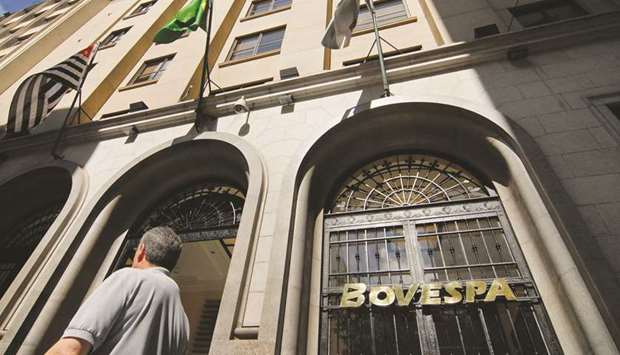Brazilian markets slipped yesterday as euphoria following the resounding approval of a landmark pension reform bill in the lower house of Congress late on Wednesday quickly faded, casting doubt over how much further the impressive rally can run.
The extent to which stocks and the currency have risen in anticipation of the bill’s passage suggests at least a pause is likely, while scrutiny intensifies over the fiscal and economic impact of the sweeping social security cuts.
In yesterday’s trading, the benchmark Bovespa stock index fell as much as 0.9%, having hit a record high of 106,650 points on Wednesday.
Brazil’s currency, the real, hit a four-month high of 3.7356 per dollar but quickly gave back all its gains.
Interest rates futures contracts were mostly higher after falling to record lows recently as traders bet pension reform approval will pave the way for the central bank to cut borrowing costs.
The lower house’s approval of the bill by a crushing 379 votes to 131 stunned even the most fervent optimists.
The chamber is expected to vote on any amendments to the bill on Thursday and give final approval in a second round vote before Congress breaks for recess on July 18. “If pension reform is confirmed this weekend, it would be very well-received (by markets), a landmark for Brazil,” strategists at investment firm XP Investments wrote in a note.
They are one of the most bullish firms on Brazil’s outlook, forecasting the Bovespa to end the year at 140,000 points, which would imply a further 31% upside from current levels.
Still, the Bovespa is already up almost 20% in less than two months, leading many to speculate that the good news on pension reform is already priced in.
The picture is similar for the real, which has risen almost 10% in the same period. This has prompted hedge funds and speculators to unwind most of their bearish bets against the currency, US futures market positioning data shows, reducing the near-term scope for further appreciation.
Interest rate markets are discounting 100 basis points of central bank rate cuts over the next year, which would bring the benchmark Selic rate, already at a record-low 6.50%, to 5.50%.
Economists overwhelmingly agree that putting Brazil on a more secure fiscal footing is an essential condition for economic growth.
However, the pension reform alone is not enough, especially if savings over the next decade end up being significantly less than the bill currently envisages.
The Independent Fiscal Institute, an independent fiscal watchdog funded by Brazil’s Senate, calculates the bill’s savings will be 744bn reais ($198bn). That is 20% less than the 933bn reais projected in the current version of bill, 25% below the 1tn reais government officials have broadly targeted and 40% less than the government’s original target of 1.237tn reais.
Economy Minister Paulo Guedes said last month that savings of around 860bn reais would be insufficient and would reflect an “aborted” reform requiring another fix in five or six years.
Brazil’s economy shrank in the first quarter and the latest indicators suggest it struggled to rebound much, if at all, in the second quarter, raising the possibility of a technical recession.
Unemployment remains stubbornly high, while the economy’s failure to recover from a deep 2015-16 recession means spare productive and industrial capacity is huge. None of that suggests consumers or business are willing to spend. “Slack holds back industrial investment, and will only reduce if consumption grows.
But consumption only increases if employment increases.
And who’s hiring?” said Jose Francisco Goncalves, chief economist at Banco Fator in Sao Paulo. Most analysts say the economy will expand by less than 1.0% this year.
The government has said growth could rebound sharply to 3-4% in the coming years following pension reform approval, which most economists consider highly optimistic. “Pension reform would lift a major cloud over Brazil’s economy.
But many of the other factors that are holding back growth in Brazil are unlikely to fade any time soon,” said William Jackson, chief emerging markets economist at Capital Economics.

Pedestrians walk past the Bovespa Stock Exchange in Sao Paulo, Brazil.
